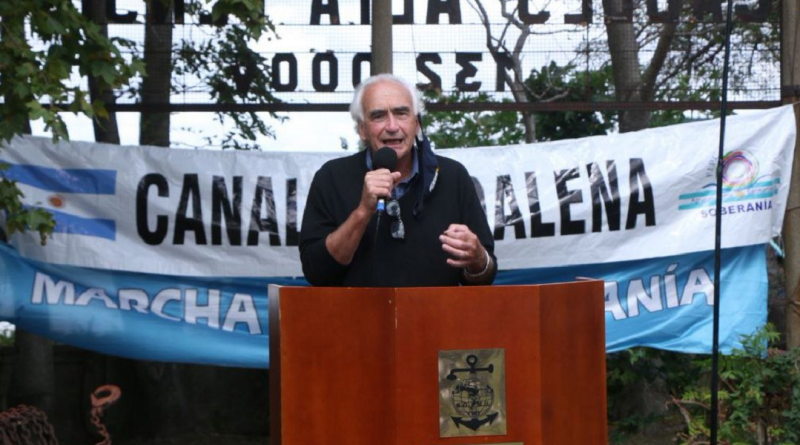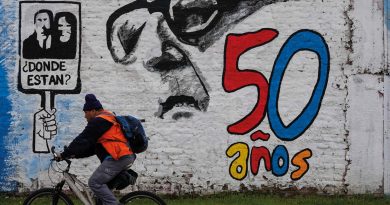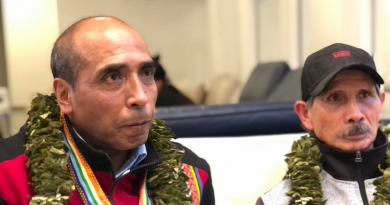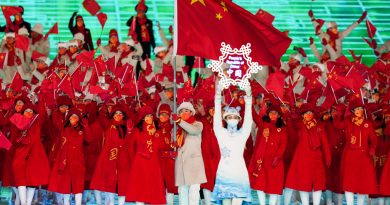Argentina’s Long Road to Economic Recovery: Interview
Photo: Tercera Información
By Ollie Vargas
Argentina suffered a catastrophic economic collapse under former neoliberal President Mauricio Macri, the country with a long and tense relationship to the International Monetary Fund (IMF) once again fell into crushing debt with the infamous international lender of last resort. In 2018, Macri signed a $US 57 billion loan, the largest in the IMF’s history. Rather than providing relief to the economy, the results was a spike in employment and negative growth. When voters headed to the polls in October 2019, 36.4% of the country was living below the poverty line, almost double the figure left by progressive President Cristina Kirchener (19.7%). Annual inflation rates of 50% became the norm.
The extent of the neoliberal destruction of the Macri period drove a landslide victory for the Peronist ticket of Alberto Fernandez and Cristina Kirchener. However, lifting ones country from under the mountain of Macri’s external debt has proved difficult. The pandemic and the lockdown measures that followed have made that task even more complex as the country faced continued negative growth due to the suspension of activity in large sections of the economy. Opposition from the domestic elites has also been fierce. An attempt in June to nationalize the huge Agro-corporation ‘Vicentin’ was abandoned after it generated huge protests from right-wing sectors, sponsored by elite interests.
To discuss the situation, and the response from Argentinian workers, Kawsachun News spoke to Ricardo Peidro, General Secretary of the CTA-Autonoma, one the country’s largest labor union confederations.
Argentina, like Bolivia, is in a phase of economic reconstruction following the neoliberal disaster that left the country with vast external debts. It seems like the path to recovery is a difficult one?
RP: In response to the effects of the IMF loans, our people launched a long struggle against Macri’s neoliberalism. Macrismo deepened the inequality in our society, destroyed the productive apparatus of the economy and increased hunger everywhere. In that struggle, our union played a key role, so we are a key factor in the defeat of Macri and the victory of the people’s government of Alberto Fernandez. Though, as we know, the pandemic has punished our societies across Latin America and made the existing injustices even more visible, especially that of hunger and poverty. To rebuild from this, we have to challenge the powerful economic interests and their spokespeople in politics who now want to take advantage of the crisis to benefit themselves and ensure that the cost is assumed by our people and our class.
In this task of rebuilding, there’s been advances as well as setbacks. Our problem is that Macri left us a huge external debt with the IMF, which we have tried to renegotiate but we all know the character of the IMF historically and of course that hasn’t changed. As workers, we have proposed that we must not apply the traditional recipes demanded by the IMF because it’s those policies that have sunk the country in the past.
Can you elaborate on what the workers movement has proposed as a route out of the crisis?
RP: First of all, we propose that the state should reactivate local production by favouring national industry and reducing our reliance on imported goods that are destroying Argentinian production and therefore jobs. 80% of the country works in small to medium sized businesses, so support for that sector is crucial. We also have a large movement here of companies that have been taken over by workers and turned into cooperatives, there needs to be more support for that because they can create jobs.
However, the challenge here is to avoid the possibility of powerful interests using the excuse of employment to take advantage of state support and to then remodel the future of work to generate a new wave of jobs without labor rights, without unions in which there only exists a private relation between a weakened worker and their master. That’s what they tried to do during the dictatorship and then again in the neoliberal period of the 90s. So we have to ensure that any negotiations with the IMF don’t result in them stripping our rights or in a new round of austerity that falls on the shoulders of the two most vulnerable groups which are the elderly and children. 60-70% of children are now living below the poverty line, we can’t allow that to worsen with new cuts.
In the rural areas, we have a number of projects and proposals around seizing inactive lands and putting them at the service of society for the production of healthy foods, and also to challenge the powerful landowners who currently control the sale of seeds and use that power to extort the country.
These are our proposals and we’re optimistic. There are new winds of change in Latin America, we were recently in Bolivia at the Runasur conference with Evo Morales, where we said that just like no section of the working class can save themselves on their own, no country can save themselves on their own either. Recovery will depend on integration and cooperation between the peoples of Latin America.
How is the relationship between the workers movement and the current government? Do you have the ear of government when making these proposals?
RP: There are three union confederations in this country, there’s
us (CTA Autonoma), the CGT and the CTA de los Trabajadores. When we engage with the government to formulate economic policy, everyone should be included, not just the three unions but also the rest of the popular sectors of society. There are areas where our relationship to the current government is strong, and areas where it’s weak, we have to remember that this is a coalition government. In this effort, we drew up the ‘Manifesto for Sovereignty, Production and Jobs’ together with the CGT and the CTA-T. We also have a channel of dialogue with the government together with some sections of small and medium sized business, where we can make economic proposals and discuss together to formulate a joint document where each sector may have to sacrifice some part of their demands so that we can reach a consensus and then take that document to our bases. The Manifesto which we submitted to the government was not purely a programme of the CTA Autonoma, but something we fleshed out through negotiating with others and reaching a consensus.
We have to continue down this path and it’s a strength of the current government that they’ve been able to bring all these different sectors. If they only talk to the powerful capitalist interests and the older layer of union leaders, then the results will be the same as always.
There are strengths, there are weaknesses. The relation between social movements and the government is a good one, we understand the gravity of the crisis and the pandemic. We also all understand the nature of Macrismo and we all united to defeat that and so we should deepen that unity now.
What about cancelling the IMF debt? In Argentina, Ecuador, Bolivia, these debts were acquired illegitimately by illegitimate governments, is a default of sorts a demand of the workers movement? What are the difficulties involved in that?
RP: Firstly, we believe that there should be an investigation into the external debt the country has, to identify which parts of it are legitimate and which parts are illegitimate. The reality is that even during the people’s governments of the past, such as during Cristina’s period, the country paid some debts which we consider to have been paid off at the expense of workers, we mustn’t repeat those mistakes.
So, we should suspend payments, investigate the debt, pay that which is legitimate, but above all, we must break the cycle in which the country is indebted, then the capital held by the elites flees and therefore the debt ends up being nationalized and then paid off at the expense of the people. We all agree, debts must be honoured, but that which is fraudulent must not be. We have to reject the possibility of traditional IMF formulas being implemented, even if it’s done with a more human face.
Thank you for your time, any final message for people here in Bolivia?
RP: It’s always an honour to speak with our comrades in Bolivia. Our union has always been committed, since the very beginning, to the struggle against the coup. We’re proud to have given shelter to so many Bolivians who were being persecuted at that time. We’re proud to have been a drop of water in the unstoppable tide that brought the return of democracy and the return of hope in Latin America.



